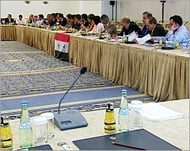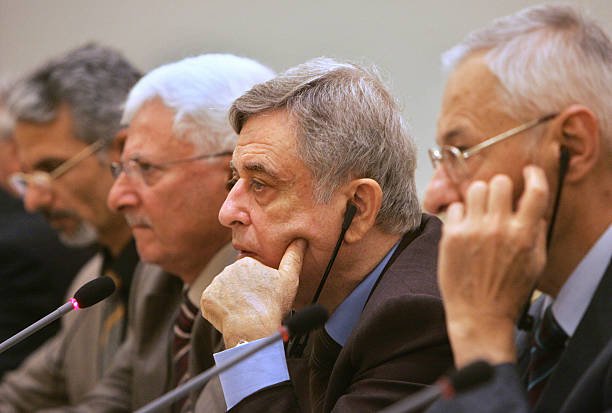Ladies and gentlemen, guests and conference members
The second conference of the National Salvation Front is taking place at a critical stage characterized by the escalating suffering of the Syrian people, intensifying conflicts in the region, and increasing threats to the security, stability, and destinies of nations, which in turn pose a risk to international peace and security. The Arab-Israeli conflict crisis remains unresolved, with various factors influencing its perpetuation, including the conflicting parties and the interests of other countries.
The situation in Iraq is the most severe in the region since the end of World War II. The American war in Iraq led to the rise of resistance against the occupation, followed by dual wars waged by Shiite Muslim extremists against the occupying forces and Sunni Muslims. Simultaneously, a war erupted involving Sunni Muslim extremists targeting the occupying forces and Shiite Muslims. These violent conflicts and wars have placed Iraq in a perilous state, endangering its unity, future, destiny, as well as the security and stability of regional countries.
In Lebanon, the situation continues to carry numerous risks to its unity, security, and stability. The Syrian regime bears responsibility for the painful events that Lebanon has endured and continues to face.
When discussing the tense and dangerous situation in the region, it is crucial to highlight Iran’s regional strategy, which extends from the Mediterranean to Central Asia and encompasses Arab countries in the Gulf. This strategy aims to serve Iran’s interests and establish its dominance over the region. Iran has succeeded in laying the foundations to achieve this strategy in Lebanon, Palestine, Syria, Iraq, and other regions.
It is noteworthy that a conflict is unfolding between the West, particularly the United States of America, and Iran regarding Iran’s nuclear program and its regional ambitions. Meanwhile, there is an absence of an Arab project to safeguard the interests, security, and destinies of Arabs.
One of the concerns shared by the Islamic world, as well as the West, Russia, China, India, and other nations, is the growth of Islamic extremism, which runs counter to the values and principles of Islam. It is highly dangerous that this phenomenon may lead to heightened hostilities between the Islamic world and other nations, inflicting significant harm on Muslims.
Ladies and gentlemen, the suppression of political life in Syria, the curtailment of public and individual freedoms, the pursuit of isolationist and exclusionary policies, the utilization of security forces and the judiciary for repression under a state of emergency, the exacerbation of economic crises and their profound impact on the standard of living of Syrians and the country’s future, along with the pervasive corruption permeating all levels of power, are all products of a despotic individual-centric system of governance. Dictatorship, by its very nature, engenders tyranny, corruption, and the impoverishment of nations.
In this perilous phase in Syria and the region, the National Salvation Front should strive to accomplish the following objectives:
- Make every possible effort to unite the Syrian opposition forces that collaborate with the Front, working towards two main goals: the peaceful overthrow of the dictatorial regime and the commitment to building a modern civil democratic state. This state should ensure equal rights and duties for all citizens, regardless of religion, sect, race, or gender. It should be led by institutions and rooted in the authority of the people.
It is crucial to clarify that the concept of democracy is founded on the principle of power transfer through free elections and the notion of modernity. Modernity entails freeing reason and will from all forms of pressure, whether stemming from power or legacies that defy reason and logic and are based on illusions.
- The National Salvation Front should continue its efforts to expose the regime’s corruption and tyranny. Its internal activities should focus on mobilizing the people and organizing their forces to prepare for Syria’s salvation and liberation from the grip of repression and corruption.
- Learn from the mistakes that occurred in the previous session of the Front’s General Secretariat, including not harnessing the capabilities of its members and institutions effectively. Develop working mechanisms that allow each member to play a role in national action. Additionally, address difficulties in media activities, developing a media policy that supports the Front’s approach and national struggle.
- Increase engagement with Arab and international entities, both popular and governmental, as well as with all forces within the international community and United Nations organizations. The aim is to aid the Syrian people in achieving their liberation from a corrupt authoritarian regime and building a democratic state that empowers them to contribute to the security, stability, and peace of the region. It is also essential to work towards liberating occupied lands, supporting the Palestinian people, and restoring Syria’s role in the Arab and international arenas.
In this context, what captures the attention of Syrians are the statements made by several officials in the West. While they criticize Bashar al-Assad and his regime when discussing Lebanon, Palestine, or Iraq, they overlook the suffering of the Syrian people under the regime’s repression. They disregard its violations of public and individual freedoms, the eradication of political life, and the assault on human rights. These officials call on the regime to change its behavior, recognizing that behavior is inherently tied to the nature of regimes. They understand that totalitarian regimes breed tyranny, corruption, and the plight of the people.
One of the primary objectives that the Front will strive to achieve is the formation of specialized working groups tasked with preparing draft programs to rebuild the state and its institutions. The goal is to ensure that the country does not descend into confusion and chaos after the fall of the regime. These projects encompass the following:
- Drafting a permanent constitution for the country based on the principles of power rotation, executive accountability to the legislative authority, an independent judiciary, separation of powers with cooperation, and delineation of the roles of constitutional institutions such as the Presidency of the Republic, the Council of Ministers, the Legislative Council, and the judiciary.
- Ensuring the constitution guarantees equal rights to all citizens without discrimination based on religion, sect, race, or sex.
- Developing a comprehensive bill to reform the national economy, encompassing its structure and various sectors including finance, monetary policy, industry, commerce, agriculture, tourism, and services. The aim is to achieve a balance between economic and social dimensions, launch initiatives for comprehensive economic development, and create opportunities for private investment. The project should also focus on increasing the country’s resources, raising the standard of living, meeting the basic needs of society, and generating employment opportunities.
- Implementing a project to reform state institutions and bodies, including the judiciary, supervisory and inspection bodies. This involves enhancing their efficiency by regulating their operational mechanisms and improving employee performance. The project should also advocate for the principle of equal opportunities and establish rules and procedures to combat corruption.
- Undertaking a comprehensive overhaul of the education sector at all levels, focusing on developing students’ personalities and enhancing their abilities in dialogue, analysis, and critical thinking. The reform project should also address the issue of specialization and the alignment of education with the present and future needs of society.
- Assigning a pivotal role to Syrians living abroad in the country’s reconstruction and leveraging their competencies to advance and progress the nation-building process.
- Recognizing that young people are the lifeblood and strength of the country, particular attention should be given to the youth sector, providing necessary qualifications, enhancing their competencies, and creating employment opportunities.
Dear members of the Conference, we are faced with significant tasks that require dedication, sacrifice, and determination. The country is in peril, and the people are enduring immense suffering under dire circumstances. We have but one choice: to achieve victory through our steadfast efforts. Let us work earnestly and responsibly to attain victory and raise the banner of freedom high in the skies of Syria.


